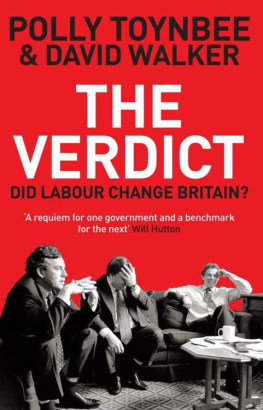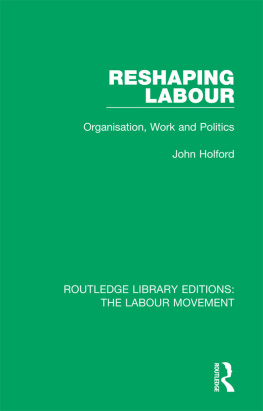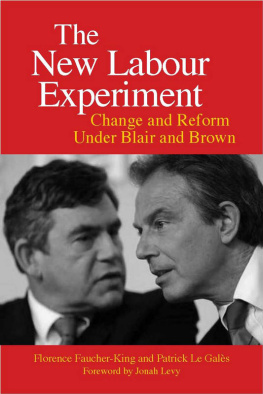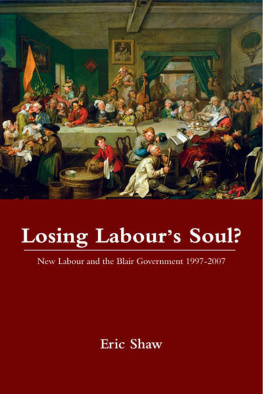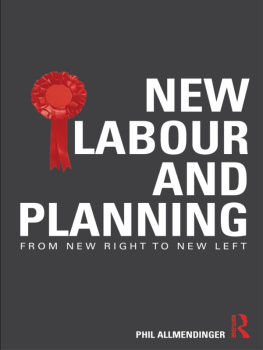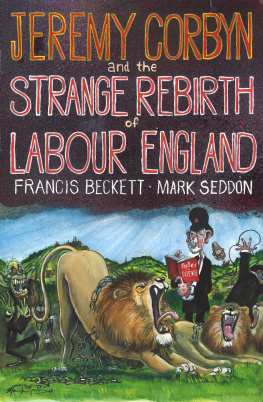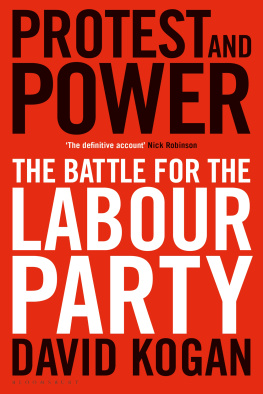Polly Toynbee and David Walker are becoming our latter-day Beatrice and Sidney Webb indefatigable researchers of and campaigners for a better society. The duo spare nothing and nobody in their robust dissection of todays Britain and how Labour, while still doing some good, muffed a once-in-fifty year opportunity for change. Its a requiem for one government and a benchmark for the next Will Hutton
The book is a good place to start learning from the past they argue persuasively that Labour was so much in thrall to the zeitgeist of unstoppable market forces that this choked off the immense possibilities of fundamental change offered by three successive elections with clear majorities Peter Hain, New Statesman
There is much here for the serious scholar of the Blair-Brown era Paul Routledge, Spectator
The book is immensely readable We may disagree with the assertion that the Iraq war was not the defining moment of the government but they give Labour six out of ten and ask why not more? Again we may dissent, but as the Con-Dem cuts appear the debate about what the Labour government achieved and what it did not and why will be important Keith Flett, Socialist Review
An illuminating assessment that focuses on policy rather than personality Steve Richards, New Statesman s Books of the Year 2010
A fair analysis and a good audit of what Brown and Blair achieved and failed to achieve Stephen Bubb, Charity Times
The Verdict
Did Labour Change Britain?
POLLY TOYNBEE AND DAVID WALKER
Contents
Introduction
No letter, no thanks, no apologies. When the blow fell on Aston Pride, the deed was done in shameful silence: in March 2011 this exemplary New Deal for Communities project was simply abandoned. No civil servants debriefed Simon Topman, the local businessman who had volunteered his time to regenerate a blighted slice of Birmingham, its local landmark the Gravelly Hill interchange Spaghetti Junction. There were no congratulations despite his having come in as chair of the struggling Aston NDC. No effort was made to replicate or rework the 54 million, ten-year programme, despite Aston Prides success in cutting crime, getting young people into the workforce, promoting healthier ways of living and bringing people together to take ownership of this overcrowded, under-skilled, heavily Asian Birmingham district, once the home of HP Sauce.
The New Deal had been Labours regeneration effort. Now the Big Society, an admans slogan that David Cameron pretended was a policy, was the next new thing. All that went before was consigned to the bin. A self-evident truth that government money and political will are essential to underpin, validate and support voluntary commitment and community action became heresy. Labours programme , aimed at reviving thirty-nine of the poorest areas, was abandoned, its lessons ignored, its accumulated experience jettisoned a curious example of wastefulness from a government pledging to save public money.
Since summer 2010, the state that Labour built has been dismantled brick by brick. It is not just the Tories or the Liberal Democrats who have undertaken this demolition: ostensible Labour progressives aligned themselves with the Cameron government, chorusing, We have to end the self-destructive reliance on the state. Tell that to mothers such as Melissa Beydilli, demonstrating outside Stoke-on-Trent town hall in early 2011. She spoke movingly of how Blurton Sure Start helped her, when her sons behavioural problems became so bad she was afraid even to take him to the supermarket: Id go to bed thinking, Oh no, Ive got another day with him tomorrow. The Sure Start staff had seen she wasnt coping. They gave me so much help, showed me how to calm him down, how to play with him. My relationship with him has completely changed. Was that an example of self-destructive reliance on the state?
As Sure Start, Every Child a Reader, Education Maintenance Allowances and other programmes fall like pins in a skittle alley, the Labour government of 19972010 appears more purposeful than it seemed at the time; less haphazard, bold even. The paradox deepens as the political personalities of Tony Blair and Gordon Brown grow less distinct. In their funding of 3500 childrens centres, of which hundreds are now closed or mere shells under the coalition government , Labour understood the once-in-a-generation opportunity to break cycles of deprivation and under-achievement. The statisticians now confirm the impact of the recession and the unequalizing trends that pushed so strongly during Labours tenure. Poverty among working-age adults had risen by 1 per cent comparing 200910 with 199899. Yet in Labours last year in office, the Office of National Statistics counted 20 per cent of UK children living in households defined as poor by agreed international standards. That was 2.6 million, far too many, but still the lowest figure since the mid-1980s, and many fewer as a proportion of all children than the 26 per cent when Labour took office. Are such figures a source of pride and a sign of Labours political distinctiveness, or a badge of shame? Was the glass half full, or half empty?
A year into the Cameron era, our account of what Labour did, especially in social policy, raises this question: why has Labours legacy proved so easy to dismantle and its accomplishments so easy to reverse? The Institute for Fiscal Studies (IFS) predicts a marked increase in child poverty as a direct result of Cameron policies. The Work and Pensions Secretary, Iain Duncan Smith, says Labour spent ineffectually. He ignores the IFS contention that without Labour-era benefits and tax credits inequality would have risen much more than it did. He makes the moralizers case that poverty is not really about money (it is about sex, procreation and marriage); but less money will lead to a renewed spurt in inequality.
The Tories have turned the failure of Gordon Brown as a political personality and national leader into a representation of Labours entire thirteen years. In the Tories view, Labour overspent, they maxed out the credit card. The Tories have sold the idea that Labour spending was excessive, despite their own and the publics enthusiastic assent at the time. By losing the macroeconomic argument for reducing the budget deficit cautiously, in alignment with the cycle of recovery, Labour has also lost the case for the funding of programmes that were slowly repairing Britains other deficit, the gap between peoples capacity and their achievement, between social potential and collective attainment.
The mess Labour left us has proved an effective mantra for the Cameron government. Labour left us with an overbearing state. Without drastic surgery, the UK would end up like Greece or the Republic of Ireland. The Tories, echoed by the Liberal Democrats, have rewritten economic history, obliterating their own support for the Brown governments response to financial collapse and the necessity of spending to counter recession. Their elision of Labours fiscal policy for dealing with the crisis and Labours social spending in general has been a triumph of political art. The National Institute for Economic and Social Research straightforwardly calls the Tory charges false: the myth that, pre-crash, UK public finances were disordered (the 2007 picture was broadly that of 1997); the myth of a huge national debt (lower in 2011 than during most of recorded UK economic history).
But why is the storyline accepted? Why arent Labours social programmes so stoutly embedded in the affections of service users and the public at large that the attack can be fended off? One reason is Browns misjudgement as chancellor. It is true that the UK confronted the financial collapse in autumn 2007 with its public finances in a reasonable state. But they would have been a lot more reasonable had Labour heeded those saying that spending plans, from 2003 onwards, were unsustainable without increases in tax revenues. And if Brown had not conducted policy as if the economic cycle had been abolished.

